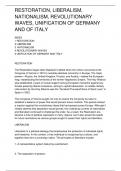RESTORATION, LIBERALISM,
NATIONALISM, REVOLUTIONARY
WAVES, UNIFICATION OF GERMANY
AND OF ITALY
INDEX
1 RESTORATION
2 LIBERALISM
3 NATIONALISM
4 REVOLUTIONARY WAVES
5 UNIFICATION OF GERMANY AND ITALY
RESTORATION
The Restoration began after Napoleon's defeat when the victors convened at the
Congress of Vienna in 1815 to reinstate absolute monarchy in Europe. The major
powers—Russia, the United Kingdom, Prussia, and Austria—redrew the European
map, redistributing the territories of the former Napoleonic Empire. The Holy Alliance
was established, a pact of mutual support among European monarchs against any
threats posed by liberal revolutions, aiming to uphold absolutism. A notable military
intervention by the Holy Alliance was the "Hundred Thousand Sons of Saint Louis" in
Spain in 1823.
The Congress of Vienna sought not only to restore the monarchy but also to
establish a balance of power that would prevent future conflicts. This period marked
a reaction against the revolutionary ideas that had spread across Europe. Although it
initially seemed that absolutism would prevail, the underlying currents of nationalism
and liberalism continued to challenge this order. As a result, the Restoration era
became a time of political repression in many regions, but it also sowed the seeds
for future revolutions as various groups sought to assert their rights and identities.
LIBERALISM
Liberalism is a political ideology that emphasizes the protection of individual rights
and freedoms. In this context, a free individual is recognized as a citizen, and
together they form a sovereign nation. The principles of liberalism include:
1. A representative system featuring a parliament.
2. The separation of powers:
, RESTORATION, LIBERALISM,
NATIONALISM, REVOLUTIONARY
WAVES, UNIFICATION OF GERMANY
AND OF ITALY
Executive: The government implements laws.
Legislative: The parliament creates laws.
3. Property law: This refers to the rules that determine ownership, usage, and
transfer of property.
Liberalism was heavily influenced by the Enlightenment, which championed reason,
individualism, and skepticism of authority. Thinkers like John Locke, Montesquieu,
and Jean-Jacques Rousseau played pivotal roles in shaping liberal thought. They
argued for the protection of natural rights and the importance of a government
accountable to the people. In this context, liberalism emerged as a counterpoint to
absolutism, advocating for civil liberties, political participation, and economic
freedoms. The growing middle class, or bourgeoisie, became a significant force in
promoting these ideas as they sought greater influence in governance and society.
NATIONALISM
Nationalism emerged as a political ideology advocating for the right of people to
determine their own destiny, known as self-determination. A nation consists of
individuals who share cultural ties and desire to live together. Nationalism can lead
to movements for independence or unification, as demonstrated by Italy and
Germany, both of which reacted against the decisions made at the Congress of
Vienna.
Nationalism was fueled by a sense of shared history, language, and culture. It often
served as a unifying force among disparate groups, fostering a collective identity that
transcended local affiliations. In many cases, nationalism was linked to liberalism, as
both movements sought to empower the populace and challenge established
authorities. This period saw the rise of nationalist leaders who inspired their followers
to seek independence or unification, using powerful symbols and rhetoric to mobilize
support.




